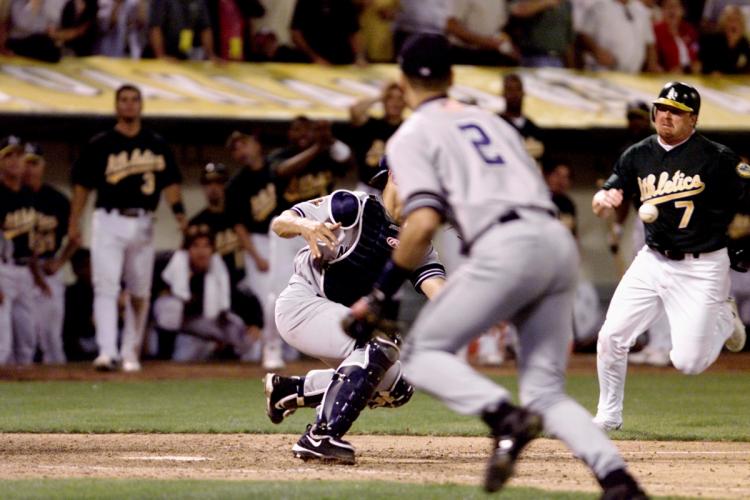|
I've been trying to figure out who left Derek Jeter off the Hall of Fame vote. My inclination is that it is somebody looking for attention, or it could be a reporter who once tried to get a quote from Jeter and received a shrug or a scowl. It happens.
My e-friend Bill Lucey in Cleveland put the vote in perspective: there have been worse shenanigans in previous Hall of Fame elections. * * * So, what’s the big deal, that one fearless sportswriter didn’t cast a vote for Derek Jeter, “Captain Courageous,” to the Hall of Fame. We're not living in Putin's Russia Just Remember: • In 1953, Joe DiMaggio was passed over on his first appearance on the Hall of Fame ballot, coming in eighth with 117 votes out of a possible 264. Interestingly, It wouldn’t be until 1955 (his third try) when Joltin Joe’ was finally elected to the Hall of Fame with 223 out of a possible 251 votes. • Mr. Chicago, Ernie Banks was elected to the Baseball Hall of Fame in 1977 with only 83.81 percent of the vote (321 votes on 383 ballots). • Jackie Robinson entered the Hall with only 77.5 percent of the vote in 1962 (124 of 160), just 2.5 percent over the required 75 percent for induction. In that same class, Cleveland Indians flame thrower, Bob Feller, “Rapid Robert,” received 150 out of 160 votes, 93.75 percent. • Willie Mays was snubbed by 23 voters in 1979 (94.68 percent); and a whopping 52 members didn’t think Sandy Koufax was worthy of the Hall, giving the Dodger southpaw 86.87 percent of the vote in 1972. • “The Splendid Splinter,” Ted Williams received only 282 of 302 votes in 1966, giving him 93.4 percent of the vote. • 11 writers, if you can imagine that, left Babe Ruth, “The Sultan of Swat’’ off their HOF ballots, giving him 95.13 percent of the vote. • Hank Aaron, who belted 755 home runs in his celebrated career, earned 97.8 percent of the vote with nine members of the Baseball Writers Association opting not to vote for him on the 1982 Hall of Fame ballot. • Ty Cobb collected 222 of a possible 226 votes, a 98.2 percentage. Knowing these greats were far from unanimous, I think we can live with one sports writer, one brave soul, deciding not to vote for the former Yankee Captain. -Bill Lucey Source: Baseball Reference * * * (Lucey works as a researcher-editor and his passion is writing, often about baseball but also finding fascinating subjects in his home town of Cleveland the way I like to think I do about my home town of NYNY. Check out his web site for a baseball-centric view of the world:) https://www.dailynewsgems.com/ * * * I am proud the NYT included two excepts of paeans I wrote about Jeter in their well-deserved coverage of his election in Wednesday's paper. The Times dissected Jeter's alert flip to retire Jeremy Giambi at home plate, which was the source of one of my favorite columns. For those of you who can access the NYT website, here is the link to "Slide, Jeremy, Slide." https://www.nytimes.com/2001/10/26/sports/sports-of-the-times-slide-jeremy-slide-slide.html?searchResultPosition=1 1/22/2020 03:26:08 pm
It is definitely a very high honor being voted into the Baseball Hall of Fame by the game’s sports writers on the first ballot, even if it was one vote short of 100%. However, I believe that recognition by one’s peers to be more meaningful.
George Vecsey
1/22/2020 07:46:50 pm
Alan: Jeter is a superb athlete, probably could have played another sport at a high college level. Also, he was raised to have high expectations -- he seems close to his parents and his sister -- and never, ever, felt sorry for himself. As an athlete, he just followed the play, as in his dive into the stands, or the Jeremy Giambi play. I wouldn't compare him to Stanky...but Slaughter earned his rep. with that one race around the bases in 1946. I've been told that later managers thought his racing to first base, etc., was false hustle.
ANDY TANSEY
1/22/2020 05:19:45 pm
I remember "Slide, Jeremy, Slide!" It was fun and I needn't reread it to know that I should try to set it to music.
George Vecsey
1/22/2020 07:51:02 pm
Andy: something mellow -- Mel Torme? Or more driving, Bob Marley (Ride, Natty, Ride)? Joe Williams? Ella? Aretha?
Roy Edelsack
1/22/2020 05:34:52 pm
The lone voter isn't saying that Jeter doesn't deserve to be in the Hall. It's stupider than that. Somewhere along the line the writers came up with subdivisions of HOF votes. There's also "first ballot hall-of-famers" and "unanimous hall-of-famers." So there's guys "who deserve to be in but not on the first ballot." And there's guys "who deserve to be in on the first ballot but not unanimously."
George Vecsey
1/22/2020 07:56:15 pm
Roy: I do understand the gradations I firmly believe there are 4-5 different levels of Hall of Fame players, including some good old boys, friends of the writers, or (more likely) friends of the old-timers committee? I have my theories. I think Larry Walker was being modest but also realistic when he talked about the old 45 records with the A side for hits, and then the B side, "And I am the B Side,"
Hansen Alexander
1/25/2020 02:34:37 pm
Ah George,
george
1/25/2020 11:54:03 pm
george, Comments are closed.
|
Categories
All
|










